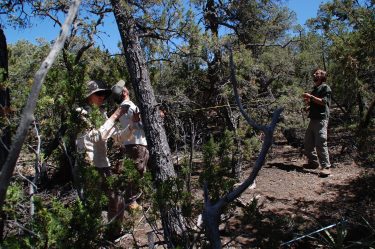
Major forest die-offs due to drought, heat and beetle infestations or deforestation could have consequences far beyond the local landscape.
Wiping out an entire forest can have significant effects on global climate patterns and alter vegetation on the other side of the world, according to a study led by the University of Washington and published Nov. 16 in PLOS ONE.
“When trees die in one place, it can be good or bad for plants elsewhere, because it causes changes in one place that can ricochet to shift climate in another place,” said lead author Elizabeth Garcia, a UW postdoctoral researcher in atmospheric sciences. “The atmosphere provides the connection.”
Just as conditions in the tropical Pacific Ocean can have distant effects through what we now understand as El Niño, the loss of a forest could generate a signal heard around the world — including by other plants.
Read more at UW Today »
